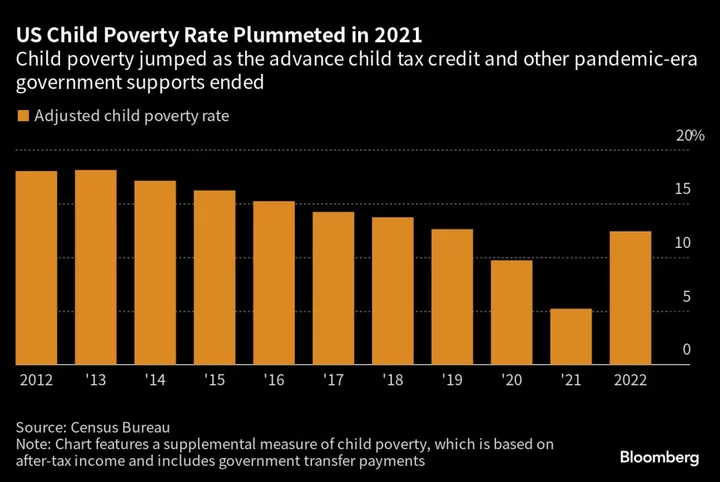Amid the chaos of the latest Republican presidential debate, voters got a rare opportunity to hear how candidates would tackle a decades-old problem now threatening to escalate into crisis: the broken US child-care system.
Concern about the availability and affordability of care has reached a fever pitch in recent months. Rising prices across the economy, combined with the expiration of $24 billion in federal funding for providers, have left millions of parents worried about losing access to a service they rely on.
With the 2024 vote still more than a year away, the answers floated on the GOP California debate stage weren’t necessarily comprehensive or new. Still, they marked a resumption of what was a bipartisan conversation two election cycles ago – about how to break the cycle of spiraling child-care costs, driven by enormous demand and poor supply.
Republican solutions often have revolved around expanding the child tax credit — as former President Donald Trump did — and putting more money in Americans’ pockets through tax cuts. That’s the fix advocated by South Carolina Senator Tim Scott in response to the debate question.
‘Golden Retrievers’
“One thing we need to do is let the American people keep their money,” Scott said. He also called for the protection of Head Start — a government program for pre-school children from low-income families, which is among the budget items that hardline Republicans in Congress have recently put on the chopping block.
Next up was Ohio businessman Vivek Ramaswamy – who changed the subject – followed by North Dakota Governor Doug Burgum, whose attempt to explain his approach was cut short by a commercial break.
If that suggests a patchy quality to the discussion, it’s clear that Republicans are aware how important the issue is to voters.
“Being opposed to affordable child care is like being opposed to golden retrievers,” Senator John Kennedy, a Louisiana Republican, told a subcommittee hearing last month.
‘Pay People Enough’
Here’s what the top eight GOP candidates vying to unseat President Joe Biden generally agree on: Too many American families are overburdened by child-care costs, further federal spending risks fanning inflation, states are better positioned to craft their own policies, and tax credits could provide more relief.
There’s a distinction there with Democrats. The Biden administration wants government spending to be part of the fix. Investments in care will essentially pay for themselves in the longer term, through higher earnings for parents and their children, advocates say.
Democrats have failed to win broad support for that approach. But there are some openings for compromise — like tax credits to help families with the cost of care.
The Trump White House doubled the maximum child tax credit to $2,000 in legislation passed in 2017. Biden expanded the credits to as much as $3,600 per child, and sped up delivery by shifting to monthly installments. But those were temporary pandemic measures. When they expired at the end of 2021, child poverty – which had plunged that year – jumped back up.
Read More: Spiking Child Poverty Forces US States to Fill In Federal Void
In a Sept. 29 interview, Biden’s top economist — National Economic Council Director Lael Brainard – flagged the policy’s success in reducing poverty, and said she’s “hopeful that we can build on that.” The administration plans to try again, with a child-care credit inserted in the last budget.
“In order to have a sustainable amount of child care, you do need to invest in the supply side and you need to pay people enough to make it an attractive place to work,” Brainard said.
‘Point of Despair’
Both are key problems. Companies are employing more women than ever, and the availability of child care is key to keeping them in the labor force.
But the expiration of federal funding at the end of September threatens to make it even harder for care providers to hire and retain workers. By one estimate, more than 70,000 of them could be at risk of closure. No GOP candidate has backed the restoration of that funding.
Read More: Threat of 70,000 Daycare Closures Imperils US Workforce Gains
There’s a long history of political battles over US child care. It’s more than half a century since President Richard Nixon vetoed a bill that would have established a national daycare system, under pressure from conservatives who were concerned about its impact on traditional family structures.
Democrats say the GOP continues to play the spoiler role. Kevin Munoz, a spokesperson for the Biden campaign, said that 90% of House Republicans voted last month to cut child-care funding during negotiations over the threatened government shutdown. “Republican candidates for president don’t have serious plans to expand access to affordable, quality child care for low- and middle-class Americans,” he said.
Still, many of today’s conservatives are increasingly convinced that something needs to be done. The right-leaning Heritage Foundation is preparing a broader plan to address problems in the supply and demand for child care.
Some elements are traditional GOP economics, like advocating the rollback of state regulations that make it hard to set up smaller daycares.
But the think tank is also looking at ways to boost and restructure the child tax credit, and to account for the “implicit costs of child care” — a parent who chooses to stay home with their child — rather than just the deductions allowed for out-of-pocket expenses, said Roger Severino, vice president of domestic policy at the Heritage Foundation.
“We’ve almost reached a moment of emergency,” said Severino. “Things have gotten to a point of despair where people are having fewer and fewer children because they feel they can’t.”
--With assistance from Hadriana Lowenkron, Nancy Cook, Christian Hall and Craig Torres.
Author: Michelle Jamrisko, Reade Pickert and Gregory Korte

